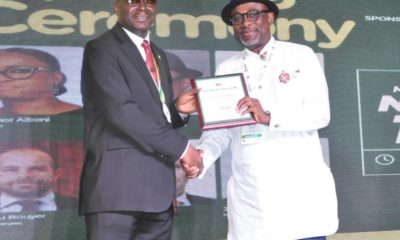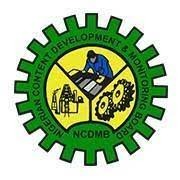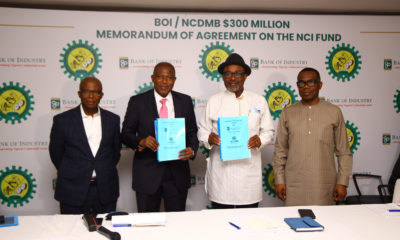Energy
NCDMB partnering Shell, Exxon, NAOC in Oil & Gas Parks – Wabote
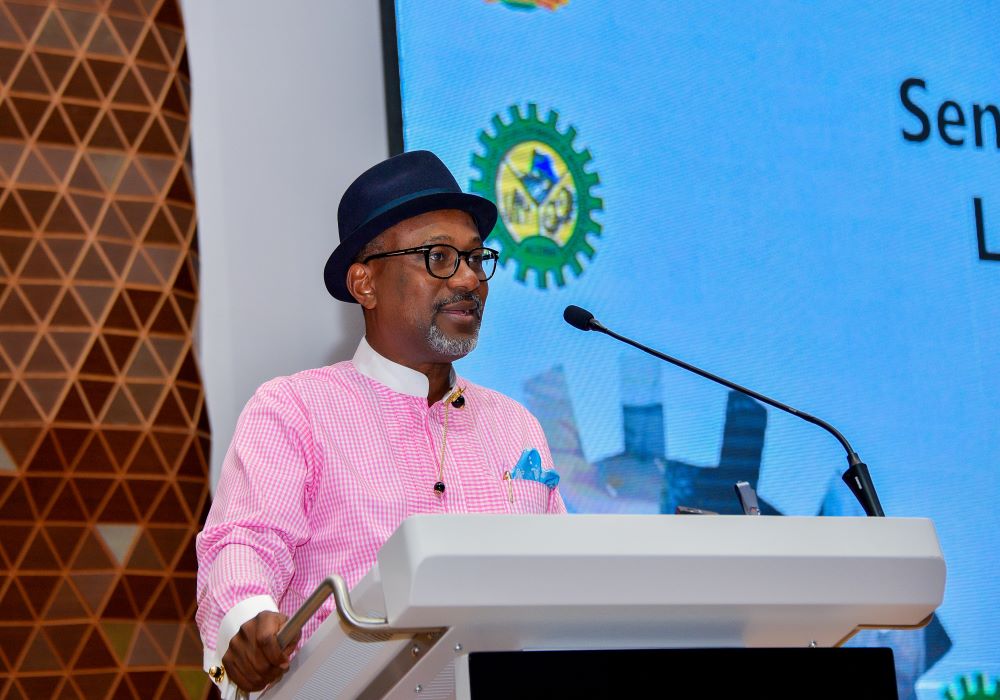
Major international operating oil and gas companies, notably Shell Petroleum Development Company (SPDC) and Exxon Mobil Nigeria, and the Nigerian Agip Oil Company (NAOC) have made significant investments in support of the ongoing development of the Nigerian Oil and Gas Parks Scheme (NOGaPS), the Executive Secretary, Nigerian Content Development and Monitoring Board (NCDMB), Engr Simbi Kesiye Wabote has revealed.
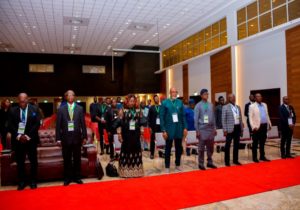
L-R: Delegates and senior officials from the NCDMB at the Nigerian Content Sensitization Programme for Law Enforcement Agencies, organised by the NCDMB in Yenagoa, Bayelsa State
He stated this recently at the Nigerian Content Sensitization Programme for Law Enforcement Agencies, organised by the NCDMB in Yenagoa, Bayelsa State with a view to strengthening the existing collaboration with various law enforcement organizations and sister agencies and leveraging their expertise and partnership to accelerate Nigerian content compliance in the oil and gas industry.
He gave a breakdown of the Board’s achievements and initiatives and hinted that NCDMB was developing the oil and gas parks in conjunction with key operators in the oil and gas industry.
According to him, Shell funded the provision of power and utility cables deployed at the oil and gas park located at Emeyal -1, Bayelsa State, while Exxon Mobil provided the electrical infrastructure for the park at Odukpani in Cross River State.
Read Also >> NCDMB To Sanction Companies For Non-Compliance With HCD Guidelines
Also, NAOC had earlier partnered with the Board to develop the 10-megawatts gas power plant that would supply electricity to the Bayelsa park when completed, in addition to providing uninterrupted electricity currently to the Nigerian Content Tower and some strategic infrastructure owned by the Bayelsa State Government.
The Executive Secretary also confirmed that the Board had signed an agreement with the Gas Aggregation Company of Nigeria (GACN) to establish a gas-fired power plant at the Odukpani, park – to provide the park with constant electricity.
He assured that the power facility will be ready before the end of 2022, about the same time the Emeyal-1 and Odukpani parks would be completed, ahead of commencing operations in early 2023.
He announced that the Board had started inviting interested manufacturing companies and other firms to apply for spaces in the parks.
The parks would have dedicated power supply and shared services and were conceived to domicile equipment components manufacturing in-country, to meet the needs of the oil and gas industry and sectoral linkages as well as create jobs for the nation’s teeming youths.
Wabote also indicated that the Board was also working to develop oil and gas parks at Oguta in Imo State, at Onna in Akwa Ibom, Ilaje in Ondo State and in Delta State, and work was progressing in different stages at the identified locations.
He confirmed that the completed oil and gas parks would be managed by professional facility managers, to ensure their sustainability.
He also stated that the Board is partnering with the Nigeria LNG Limited to develop the Brass Island Shipyard as a Capacity Development Initiative.
He hinted that the feasibility study, geotechnical survey, and site selection study had all been completed.
In addition, the land valuation and perimeter survey had also been completed and the plan is to construct the shipyard in two phases, he added.
Speaking further on the rationale for organising the workshop and engaging with law enforcement agencies, the NCDMB boss noted that “when you are speaking the same language with Customs, they will guard against the importation of goods that can be produced incountry, while immigration will help in terms of expatriate quota management.”
In his welcome address, Head Legal Services NCDMB, Barr Naboth Onyesoh said the Board recognizes the power of collaboration and the impetus it generates for the attainment of its mandate and that is why Compliance and Enforcement is one of the five pillars of the Board’s 10-year Strategic Roadmap, formulated to drive Nigerian content growth to 70 percent by 2027.
He remarked that “collaboration and stakeholder engagement was also identified in the same 10-year Roadmap as one of the four enablers to attain the 70 percent Nigerian Content growth target.”
He maintained that since the oil and gas industry serves as the mainstay of Nigeria’s economy, all stakeholders of the industry should support the implementation of the Nigerian Content Act to ensure that Nigeria derives maximum value from the oil and gas industry while it is still relevant in the global energy mix.
The workshop featured several presentations and panel discussions from representatives of the invited agencies and legal luminaries who proposed various strategies for improving enforcement and compliance with the Nigerian Oil and Gas Industry Content Development (NOGICD) Act.
Corporate Communications
July 1, 2022
Energy
SNEPCo, Former MD Aiboni Win Energy Times’ Awards

The Shell Nigeria Exploration and Production Company (SNEPCo) has been named Major Oil Company of the Year for last year by a Nigerian publication, Energy Times.
Biztellers reports that this is in recognition of the company’s contributions to deep-water oil and gas development and the industry generally.
Energy Times also awarded the title of Amazon of Nigeria’s Oil Sector for 2024 to Elohor Aiboni, a former Managing Director of SNEPCo now on international assignment in Brunei.
The awards were presented to SNEPCo’s Senior Operations Manager, Bolanle Odunayo-Ojo, who represented the Managing Director, Ronald Adams at a ceremony attended by key stakeholders in the oil and gas sector.
ALSO READ: BREAKING: Again, Dangote Cuts Petrol Price To N835 per Litre
“We are honored to receive the recognitions for the company and our former Managing Director as they underscore our dedication to excellence in the upstream sector,” Bolanle stated. “The modest achievements are result from teamwork and support by our partners, particularly the Nigerian National Petroleum Company Limited and regulatory agencies. The awards encourage us to continue to work together to power progress and innovation in Nigeria’s energy landscape.”
The SNEPCo has been a pioneer in Nigeria’s deep-water oil and gas production since it began production from Bonga in 2005, Nigeria’s first deep-water well. Gas from Bonga is also piped to Nigeria Liquefied Natural Gas Company Limited at Bonny Island. SNEPCo’s operations have led to significant discoveries, including Bonga Southwest in 2001 and Bonga Northwest, which began production on August 5, 2014.
In its award, the Board of Directors of Energy Times pointed to the continuing success of Bonga, notably production of the 1 billionth barrel of oil in February 2023 and the recent Final Investment Decision on the $5 billion Bonga North project.
The award on Aiboni’s highlights a career that has seen her serve in various business and leadership roles within and outside Nigeria. She was appointed Managing Director of SNEPCo in 2021 and led initiatives that deepened operational efficiency, local content development and social investment projects across the six geopolitical zones in the country.
Energy
Shell Commends Oloibiri Lecture Series As Platform For Change

Shell Nigeria Exploration and Production Company Ltd (SNEPCo,) one of the sponsors of the Oloibiri Lecture Series and Energy Forum (OLEF) has commended it as a platform for driving change in Nigeria’s energy sector through the discussions that centre on business performance, cost discipline and process simplification.
“This event is special to the Shell brand, not only because of the nostalgia of Oloibiri but the quality of discourse it has enabled in our sector over the years,” SNEPCO Managing Director Ronald Adams said in a goodwill speech delivered by General Manager, Wells and Geosciences Operations Joe Mordi. He said: “We are grateful to the Society of Petroleum Engineers and our host the Petroleum Technology Development Fund (PTDF) for another successful outing.”
Organised by the Society of Petroleum Engineers (SPE) Nigeria Council, the Oloibiri Lecture Series and Energy Forum began in 1991, in commemoration of the country’s first commercial oil discovery by Shell at Oloibiri, Bayelsa State, in 1956. Ronald said recent developments in the Upstream and Downstream sectors of the energy industry, including the $5-billion final investment decision by Shell in the Bonga North Deepwater project echoed the sentiments around the first oil discovery.
ALSO READ: No Safety Guarantee For Unscheduled Visitors To Benue – Gov Alia
He noted that, “These strides come with a commitment to excellence required of us – for stakeholders, colleagues, our country and indeed, future generations. The theme for this year ‘Driving energy sustainability through technology, policy and supply chain excellence’ reflects this commitment. The future is bright, and we have the opportunity to co-create it.”
Energy
NLNG Improves Nigeria’s Domestic LPG Supply Efficiency

In line with its continuous improvement culture, the Nigeria LNG Limited (NLNG) will be working closely with its stakeholders to improve operational efficiency in its domestic Liquefied Petroleum Gas (DLPG) supply in Nigeria.
According to a statement from its General Manager, External Relations and Sustainable Development, Sophia Horsfall, this was highlighted at an engagement session with stakeholders in Lagos.
It was gathered that the NLNG plans to enhance engagement and improve operational efficiency of its LPG supply through digitalisation of some of its processes which include a new platform designed to streamline regulatory processes, optimise risk management, and enhance the buyer experience. The platform will feature IT-supported relationship management, automated issue resolution, centralised real-time payments, and improved case management systems, ensuring a seamless supply process despite market shifts and external pressures.
ALSO READ: Ifon-Ilobu Crisis: Adeleke Assures Of Quick Restoration Of Peace
Manager, Commercial Contract Management, NLNG, Tolulope Longe, reiterated that the planned improvements will enable and consolidate NLNG’s resolve to delivering 100% of its LPG supply to the Nigerian market.
She said a strategic roadmap was in play to ensure the achievement of NLNG’s longstanding goals of LPG being accessible and available in the country, aligning with its vision of being a globally competitive energy company, improving lives sustainably. She also harped on the significance of these improvement initiatives and the Company’s push for LPG utilisation as a clean energy source alternative to kerosene and other fossil fuels
Longe noted that the Company remained focused on growth and sustainability of the LPG market by continuously enhancing its supply processes in collaboration with offtakers. She stressed NLNG’s commitment to collaborating with stakeholders to maintain pricing stability and long-term market viability. While acknowledging industry concerns, she noted the importance of operational efficiency in meeting market demands.
NLNG aims to strengthen stakeholder engagement and improve market efficiency in the LPG sector through enhanced customer interactions, minimised schedule disruptions, timely confirmations and deliveries, and prioritisation of customers with demonstrable capacity. As it adapts to market realities, NLNG remains committed to driving sustainability and delivering lasting value to Nigerians.

